| Cover Story
 Missing the Post Missing the Post
Kajalie Shehreen Islam
Photos: Zahedul I Khan
It is difficult to associate mail delivery with the image of a man, spear and lantern in hand, a bugle and a heavy sack full of mail on his shoulders, ready to brace the attacks of criminals and wild animals alike in the dark of the night as he runs to deliver mail from one point to another. The “runner” of the yesteryears, romanticised in poetry and film, seems like a fictional character today. Likewise, pigeons and messengers on foot, horse-drawn dak of the 13th century and palki dak (palanquin postal service) of the 18th century. The transport of mail by railway in the 1850s and by air in the 1930s seems more real. But, despite the technological developments, the advent of speedier and more convenient forms of communication such as the telephone, electronic mail and, of course, cellular phones in our hectic lives today, has rendered the post office a dying institution. Or has it?
Every morning, 24-year-old Maheen Rahman waits for the postman. For letters from the foreign universities to which she has applied. For the birthday card from the UK which her best friend sent two months earlier. She has received nothing. Finally, she communicates with the universities over email and a reliable courier service and asks her family and friends not to send birthday cards or letters anymore. She does not have the time or patience to reply anyway, along with the uncertainty of its ever reaching its recipient.
This is how many of us have stopped writing those endless pages of letters to family and friends, letting them know the major and minute details of our lives, in our own handwriting, on paper chosen especially for them. We just do not seem to have the time and, let down by our postal service, it just does not seem worth the effort.
 According to Mobasherur Rahman, Director General, Bangladesh Post Office (BPO), communication between people has not declined. But, whereas previously 95 percent of it used to be between individuals and five percent between individuals and businesses and among businesses, now it is the other way around, with the lion's share of communication being among businesses and between businesses and individuals. The small percentage of communication between individuals is the business that the post office gets, which does not translate into earnings for the organisation. “Courier service companies get the cream of the business,” says Rahman, “delivering to cities and abroad, while we have to have three people working at a village post office which does not get even 10 letters a day and where these companies do not operate.” According to Mobasherur Rahman, Director General, Bangladesh Post Office (BPO), communication between people has not declined. But, whereas previously 95 percent of it used to be between individuals and five percent between individuals and businesses and among businesses, now it is the other way around, with the lion's share of communication being among businesses and between businesses and individuals. The small percentage of communication between individuals is the business that the post office gets, which does not translate into earnings for the organisation. “Courier service companies get the cream of the business,” says Rahman, “delivering to cities and abroad, while we have to have three people working at a village post office which does not get even 10 letters a day and where these companies do not operate.”
According to the Post Office Act, 1898, government media have the exclusive privilege of carrying letters and thus couriers providing this service are doing so against the law. “However, as we cannot ensure the service, we don't fight it,” says Rahman. In fact, the BPO had approached a few government organisations and private cellular phone companies asking them to use its services instead of courier companies to transmit bills, but after they agreed, the BPO itself, lacking confidence, backed out.
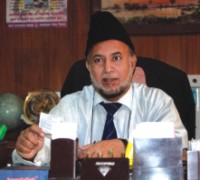 |
Mobasherur Rahman, Director General,
Bangladesh Post Office. |
There are many stories of how, in the past, people used to get mail with just the name and area on the envelope, without even a specific address. Or how letters would reach their recipients within three days of being mailed. Or even how an undelivered letter would be returned to the sender by return letter service. Today, however, even a letter with a complete and correct address takes weeks to reach its recipient, if it does so at all. How is it that a man on foot or horseback could deliver promptly what airlines and a computerised system today cannot? According to Rahman, the postal service is caught in a net of bureaucracy, which forces it to function below capacity and makes it inefficient.
“For 200 years, the post office has been running as a government organisation,” says the DG. “The British wanted to control the flow of information and the organisation continues today as a controlling and not a facilitating device as businesses are nowadays. It is all about what you cannot do, not what you can.”
The biggest problem the postal service faces is the manpower, says Rahman. “The post office is understaffed by almost 4,000 personnel, but due to the bureaucratic process, it is taking years to fill these posts.” In the Cantonment, where there should be at least two postmen, there are none, only one postmaster. In Uttara, there used to be one postman when there were hardly any people living there, and now, even though the area has grown, there is still only one postman. Security at the post offices is also inadequate due to shortage of manpower. “Not only are new posts not being created for new areas, but even the vacated ones are not being filled,” says Rahman. “We need to have the power to recruit people and to prevent any manipulation in the process so that only the deserving are hired. But this is only possible if we have autonomy.”
There are over 9,800 post offices in Bangladesh. While some post offices are understaffed, others are functioning at below capacity. According to Rahman, a study of all the “beats”, the timings of postmen and the locations in which they operate, showed that they could make 50 lakh more deliveries if the system allowed it.
 |
| Busy at work at the General Post Office in Dhaka. |
Caught in the quagmire of red tape, even the traditional “candidate system” has been done away with. Under this system, every village would have two postmen. In addition, there would be a reserve of “candidates” or substitutes selected after being trained and tested, who would come into the office every morning to see if the postmen were in and, if not, fill in for them that day so that the office would not be short of staff. “This was a unique and effective system,” says Rahman, “but it was stopped four or five years ago, and even previous candidates have lost all their benefits.” There are also some management problems. One of them is that the post office does not have its own audit system, which sometimes results in fraudulent practices. With an internal three-person check as is currently in place, if all three are involved in the crime, it is difficult to trace. In one incident, for example, a post office lost 20 crore taka as a result of fraud.
The BPO has accrued a deficit of about 130 crore over the past three or four years. For this reason, the budget, instead of being increased, has actually decreased. “Ninety-one percent of our total expenses go towards people's salaries,” says DG Mobasherur Rahman, “and nine percent into everything else.”
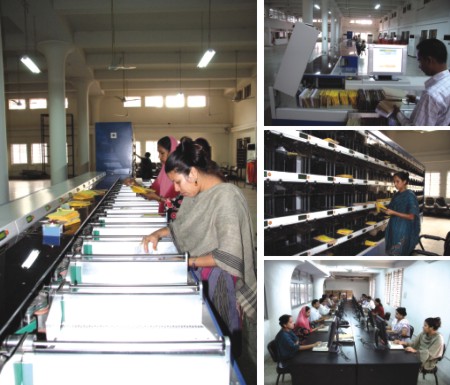 |
| People at work in different sections of the automatic letter sorting machine. |
“But we can overcome this deficit,” he says, “if we can generate business.” There are a number of ways in which the DG proposes to do this. One is through the establishment of small post shops at every post office, which would sell stationary. Another is the philately section of the BPO.
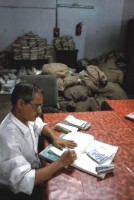 |
Understaffed and behind in technology, the Bangladesh Post Office needs re-vamping. |
“The British Queen's biggest asset is her box of stamps,” says Rahman. “Philately is big business these days.” Not only do many local collectors come to the philately section, but it also supplies stamps to philatelists around the world. For example, a deal is currently underway to sell two lakh sets of stamps on the Beijing Olympics, which, if the price is right, could mean profits for the BPO.
“We are also trying to bring the post office to people's doorsteps,” says Rahman. There are mobile post office vans which make the service more easily accessible and five new ones have been procured and distributed recently to the postal circles in Dhaka, Chittagong, Khulna and Rajshahi. Plans are also underway for creating agencies of the BPO which will be in every neighbourhood so that when people step out of their homes, they will find not only courier services but also the post office.
Though late in adapting to technological advancements, steps are being taken to modernise the whole system. A proposal sent to the government four years ago asking to computerise the system has finally been passed. An automatic letter sorting machine, purchased recently, sorts 36,000 letters per hour, by scanning the postal codes on the envelopes and sending them to their respective sections for delivery. Often, however, people do not write the code, in which case the letters have to be sorted by hand. The BPO has also recently made an agreement with Western Union for international money transfer in one minute.
Besides regular domestic and international mail services, the BPO also has express mail services for speedy and reliable delivery of packages. In 2000, it introduced E-Post, an electronic mail service which allows people without internet access to send and receive messages and scanned images over email at the post office. Financial services such as life insurance, savings bank, savings certificate, money orders and postal orders are some of the most widely-used services of the post office today.
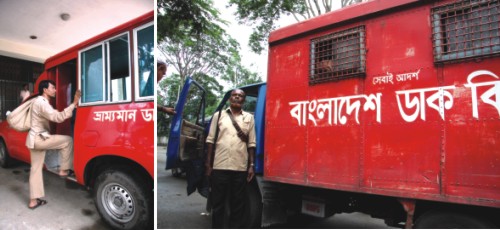 |
| A postman on his way (L); an armed guard and truck of the Bangladesh Post Office (R). |
Rafiqul Islam, the postmaster at Mohammadpur Post Office, who has been in the service for 27 years says, “We get less letters now, but a lot of people bank with the post office.” According to Mobasherur Rahman, for those who work in cities and need to transfer money to their villages, the BPO is the only means of doing so, through money orders totalling around 40 lakh taka every day. A service less known about is the agreement of the worldwide postal department to deliver literature for the blind free of charge. The BPO transmits blind literature packets consisting of papers, periodicals and books in Braille weighing up to 8 kilograms, for free.
The BPO website has details of all these services as well as options to calculate the rates for mailing different items to different places, track parcels and registered mail and find postal codes.
 |
Besides regular and express mail, the post office provides a variety of other services. |
Communication is a basic human right and it is a government pledge to provide equal basic communication services to the people. “The BPO is a service organisation and we are servants of the people,” says Mobasherur Rahman. “The first things taught to post office personnel at training are morality and loyalty to the company and most of our staff are honest and responsible.”
“We need to have customer confidence and thus we try our best to respond to complaints made against our services and to amend them,” says Rahman. People can call the BPO to report non-delivery of mail to the grievance manager. They can also send complaints via the BPO website, which has been voted the number one government website in Bangladesh. Some people who have done this, however, complain that nothing was done after the initial automated response.
“We cannot solve 100 percent of the problems,” says the DG, “but we try. Inspectors are sent out to inquire about the complaint and a lot of disciplinary action has been taken. Sometimes, people's problems are solved as soon as the inquiry begins and final action is not even necessary.” However, says Rahman, this causes a decline in service as, a limited number of inspectors who are supposed to be monitoring the regular quality of service of the post offices are busy following up on complaints.
At the General Post Office (GPO), Mukta, a student of Eden College, has come to mail a letter. She says she has come here after a long time, and her friend Shuhil, a student of Dhaka College, says it is the first time he has been to a post office. “Now with the telephone and email, you hardly need to write letters,” says Mukta.
In front of one of the counters at the GPO, Palash, a private service holder, finishes writing a letter to his older brother in Bahrain. “I come here sometimes,” he says. “Courier companies are more modern. Here, sometimes there are problems with weighing things in the case of sending parcels. It is also very crowded at times. But generally the service is good.”
For millions of people without any other communication options, the post office remains the only means of keeping in touch with family and friends, whether by writing letters or sending money orders or parcels. For others, nothing can beat the charm of a long, detailed handwritten letter every once in a while. Undoubtedly, if the service were more reliable, many more people would choose the BPO over private companies. But that customer confidence remains to be cultivated.
In the meantime, DG Mobasherur Rahman refuses to believe that the post office is a dying institution. “The postal service may be on the verge of dying but there is so much prospect for it to thrive. Given the opportunity, we can overcome our deficit and become a successful and profitable business organisation which will provide quick and efficient service to the people.”
The Postal Museum
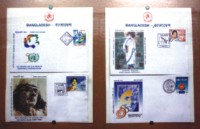 The Postal Museum, established in 1985, is situated on the third floor of the General Post Office in Dhaka. Few people know about it, however, and Abdul Malek, a caretaker at the museum for the last 24 years, says there are between 20 and 50 visitors daily. The Postal Museum, established in 1985, is situated on the third floor of the General Post Office in Dhaka. Few people know about it, however, and Abdul Malek, a caretaker at the museum for the last 24 years, says there are between 20 and 50 visitors daily.
The museum consists of two rooms. One houses ancient post office memorabilia, from a life-size statue of a runner with spear, lantern and bugle in hand, to weapons, including guns, and other equipment used by runners on display. There are also post boxes from Victorian times and modern post boxes from around the world, franking machines and a replica of a floating mobile post office. There are age-old scales which were used to weigh mail, post office seals and old, rusted badges, uniforms, bags and other paraphernalia used by post office personnel from centuries ago. The other room of the postal museum is filled with around 3,000 stamps from almost 200 countries displayed in glass cases.
The museum is open on weekdays from 9:30AM to 4PM.
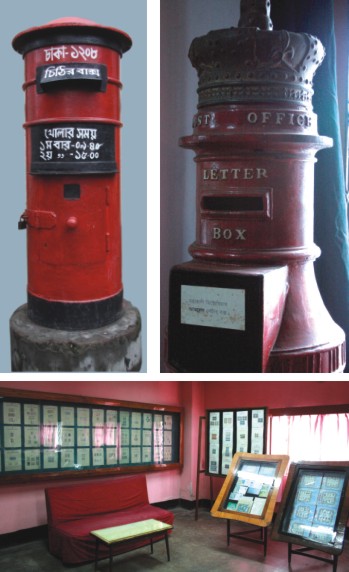
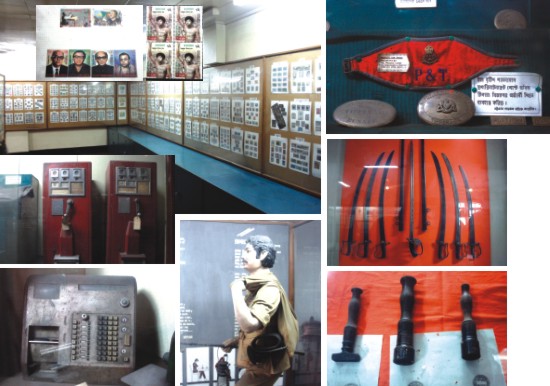
Copyright
(R) thedailystar.net 2008 |
